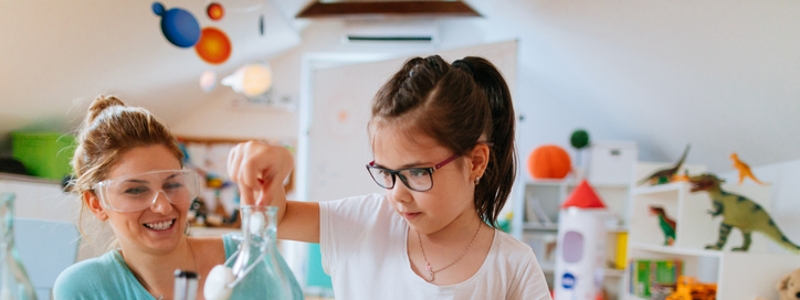With British Science Week taking place between the 6th and 15th of March 2020, we thought there was no better time to celebrate all things science! Encouraging an interest in science at home will not only boost your child’s future career prospects as many jobs will require STEM skills, but will also enhance their critical thinking skills. Here’s some fun and interactive science activities for you and your kids to do together. Whether you want to spend a lazy Sunday trying them all out or an afternoon after school trying out just one- we guarantee you’ll have loads of fun!
Baking Soda and Vinegar Volcano
This experiment is all about chemical reactions. The combination of baking soda and vinegar creates a fizzy overflow, which makes carbon dioxide turn into gas. Just watch your child’s face as the volcano erupts!
You’ll Need
- 1/4 cup vinegar (up to a cup if you have a large bottle)
- 2 tablespoons baking soda
Instructions
- Place the vinegar in the bottle using a small funnel.
- Add in the baking soda into the vinegar as fast as you can.
- Stand back and watch the volcano erupt.
Tip: Make sure you do this experiment with some tea towels around or somewhere that you can clean up easily- it can get quite messy!
Invisible Ink
Making invisible ink is a lot of fun- your kids can even pretend they’re a secret agent and write out secret codes and messages to you. All you need is some basic household objects and the hidden power of lemon juice.
You’ll Need
- Half a lemon
- Water
- Spoon
- Bowl
- Cotton bud
- White paper
- Lamp or another light source
Instructions
- Squeeze some lemon juice into the bowl and add a few drops of water.
- Mix the water and lemon juice with the spoon.
- Dip the cotton bud into the mixture and write a message onto the white paper.
- Wait for the juice to dry so it becomes completely invisible.
- When you are ready to read your secret message or show it to someone else, heat the paper by holding it close to a light bulb.
What’s happening?
Lemon juice is an organic substance that oxidizes and turns brown when heated. Diluting the lemon juice in water makes it very hard to notice when you apply it to the paper, so no one will be aware of its presence until it is heated and the secret message is revealed.
Make Your Own Slime
Is there anything that sounds more fun to your kids than making their own slime? Not only are they learning about chemical reactions, they’re left with a substance they can squish, mould into shapes or even bounce on the ground.
You’ll Need
- 2 containers (1 smaller than the other, preferably a film canister)
- Water
- Food colouring
- PVA glue
- Borax solution (ratio of about 1 tbsp of borax to a cup of water)
Instructions
- Fill the bottom of the larger container with PVA glue.
- Add a few squirts of water and stir.
- Add 2 or 3 drops of food colouring and stir.
- Add a squirt of borax (possibly a bit more depending on how much PVA glue you used).
- Stir the mixture up and put it into the smaller container. By now the mixture should be joining together, acting like slime.
What’s Happening?
The PVA glue you use is a type of polymer called polyvinyl acetate (PVA for short), while the borax is made of a chemical called sodium borate. When you combine the two in a water solution, the borax reacts with the glue molecules, joining them together into one giant molecule. This new compound is able to absorb large amounts of water, producing a rubbery substance which you can squish in your hands or even bounce.
Invisible Liquorice
Watch your children be amazed whilst they try and figure out if the liquorice melts or simply disappears. This experiment is all about how oil redirects light, causing half the liquorice to vanish!
You’ll Need
- Liquorice or candy straws
- One tall drinking glass
- Cooking oil
Instructions
- Pour the oil into the glass.
- Put the liquorice stick into the glass.
- Lean it against the side of the glass.
- Now look at the side of the glass and slowly turn it. Does the liquorice get wider and narrower, or completely disappear?
What’s happening?
Oil bends light. In fact, it can bend the light so much that if you hold the glass the right way, the liquorice leaning against the side of the glass is completely hidden from your eyes. Cool or what?
For more information or to get involved in British Science Week head over to the website here: https://www.britishscienceweek.org.

